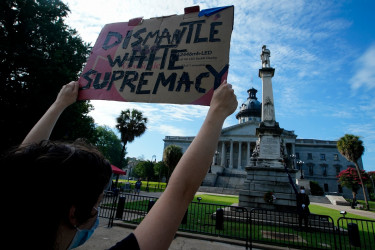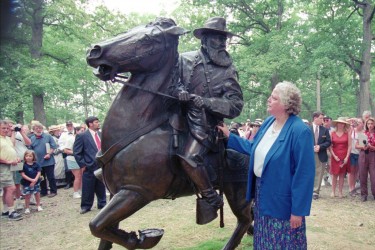White House Chief of Staff John Kelly and Confederate commander Robert E. Lee share more than just a Marine Corps connection. They also subscribe to a peculiar definition of honor.
Last week, in the space of about 30 seconds, Kelly issued a sweeping apologia for rebellion — blaming the Civil War on a failure to compromise, rather than on the radical separatism of a slaveholding elite, while also excusing Lee’s personal secession as the action of “an honorable man.”
In doing so, Kelly parroted the justifications that Lee himself offered in his lifetime. “I could have taken no other course without dishonor,” Lee claimed after the war, thus absolving himself of all guilt and virtually ridding himself of any agency in a rebellion that ultimately killed an estimated 750,000 men. Lee washed his hands of treason with the solvent of honor.
Of course, some might reasonably argue that it’s fundamentally dishonorable to take up arms against the government you once swore to defend. Especially to do so in the name of a new nation dedicated to the preservation and expansion of chattel slavery.
Yet Kelly’s interpretation of Lee’s actions is far from iconoclastic or even unique. It might, in fact, be a majority opinion in the U.S., if certain polls are any indication. Meanwhile, gas stations and gift stores across the country still hawk Confederate knick-knacks with Lee’s steely visage, accompanied by quotes about honor.
Whether for purveyors of Confederate kitsch, the White House chief of staff or broad swaths of the American population, the image of a conflicted yet resolute Robert E. Lee will likely remain the archetypal Confederate. And that’s largely because this sanitized version of Lee removes the ugliness of slavery from the narrative of secession and replaces it with the seemingly unobjectionable concept of honor. This is historical alchemy at its finest.
But if, in his mind, Lee was bound to the Confederacy by the dictates of honor, what exactly did he mean by this powerful concept?
Honor, as the late Bertram Wyatt-Brown explained in his study of the subject, was central to social relations within America’s slave states. For a typical 19th-century Southern man, the code of honor tightly prescribed public behavior and masculine conduct. It essentially equated to one’s standing in society. A man of honor could hold his head high in his own community, while a man who lacked honor was, in effect, a social pariah.
Honor was a fragile thing — it could be challenged and undermined and wiped away by any number of affronts. It therefore necessitated vigilant and often violent defense. No self-respecting Southern man of honor could abide a slight on his reputation or the reputation of his family without taking action to redress the insult.
This is why the slave states witnessed a disproportionate number of duels during the antebellum era, whereas the practice had largely died out in the North. According to one traveler to the slave states, Southerners referred to their dueling appointments “with the nonchalance of an invitation to a dinner party.”
Southern men were notoriously quick to reach for their pistols to settle a wide range of personal differences. Disputes over politics, over money, even over the affections of women could lead to the so-called field of honor. Public insults, especially those printed in newspapers, demanded “satisfaction” — that is, either a public apology or a bloodier resolution with firearms. A former South Carolina governor laid out the guidelines for such confrontations in his 1838 handbook on dueling etiquette, The Code of Honor.
Slavery — the South’s “peculiar institution” — bred an equally peculiar definition of honor.
This was something that Northern and foreign observers at the time noticed: slavery, honor and violence all seemed to feed off one another. They noted that the inherent brutality of the Southern slave system encouraged in the master class a certain carelessness with human life and a readiness to draw blood over seemingly minor matters.
Furthermore, the rural nature of the South and the relative autonomy that slaveholders enjoyed within their own plantations discouraged a reliance on formal legal proceedings to settle disputes. One’s reputation could not be properly defended within a courtroom.
Southern politicians often framed their political actions — their opposition to abolitionism, in particular — in the language of honor. When, in 1856, Preston Brooks of South Carolina bludgeoned the antislavery firebrand Charles Sumner with a heavy walking cane on the Senate floor, he did so in the name of Southern honor. And when some Southern lawmakers fashioned commemorative rings from pieces of Brooks’ shattered cane, they too referenced their region’s honor — now properly defended, in their eyes.
This bloody honor culture wasn’t confined to aristocratic duels or congressional canings, however. Whereas planters typically settled their scores with pistols, poor whites generally resorted to their fists. In the endemic brawling culture of the lower-class South, honor was often measured by how badly a combatant could disfigure his rival. Chewing off noses, ears and fingers or dislodging eyeballs — all this was considered fair game when one’s reputation was at stake. One horrified witness recalled that the combatants’ body parts could often be found mingled with the dirt in the aftermath of one of these grisly spectacles. Such was the price of honor.
As the nation careened toward civil war, the language of honor provided a ready-made propaganda tool to enlist the support of non-slaveholders in a slaveholders’ rebellion. Leading secessionists recognized that appeals to economic interest wouldn’t sway those who stood to gain nothing financially by the perpetuation of the slave system. But appeals to honor would. So they framed the choice in particularly stark terms: submission to the so-called Yankee horde, or honorable defense of one’s homeland.
The fire-eating William Lowdes Yancey of Alabama issued a representative call to arms at the 1860 Democratic convention in Charleston: “Ours is the property invaded; ours are the institutions which are at stake; ours is the peace that is to be destroyed; ours is the honor at stake — the honor of children, the honor of families, the lives, perhaps, of all.”
If honor dictated that minor insults should be redressed with pistols, canes and fists, then armed rebellion was the only recourse for the perceived — or rather, the imagined — aggressions of Abraham Lincoln and the Republican Party. This was the logic of secessionists on the eve of Civil War.
And it was a logic that a self-conscious Southern aristocrat like Lee could readily embrace. He may have been more conflicted, at least initially, over the question of secession than radicals like Yancey, but Lee ultimately turned to the same moral dichotomy: dishonorable submission or honorable resistance. The language of honor thus enabled him to transform what was, in fact, a slaveholders’ rebellion into a war for personal reputation.
So perhaps John Kelly was right. Robert E. Lee truly did take the path of “honor” — understood from a 19th-century Southern perspective — when he drew his sword against the United States. But in this case, honor was the enemy of justice.











